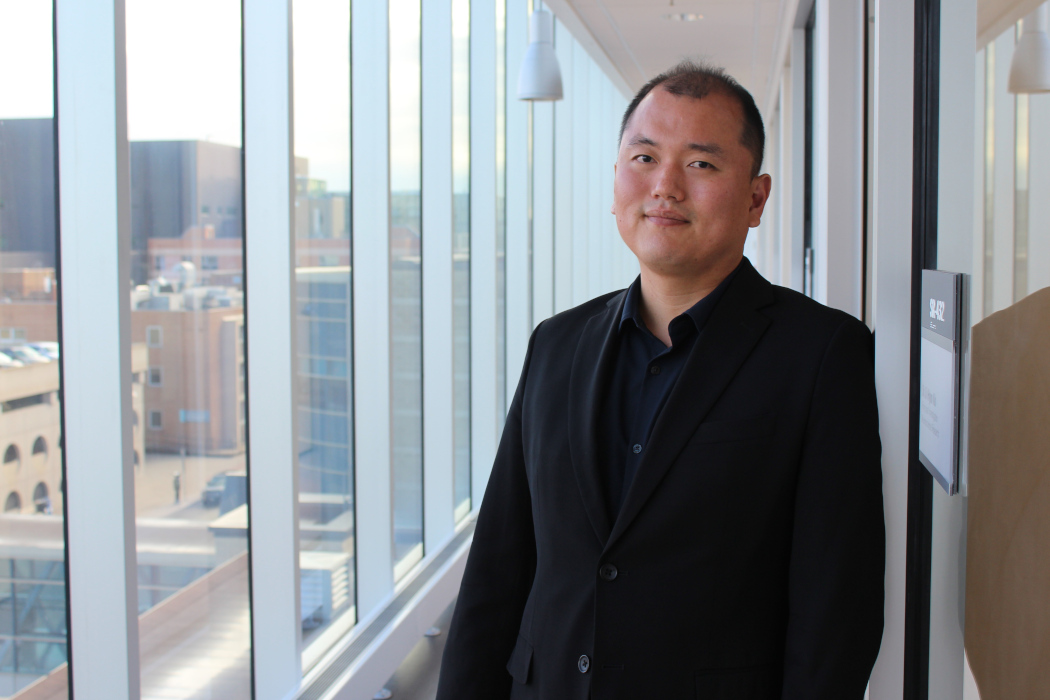
Dr. Ji Hyun Ko
Leading brain neuroscientist appointed Canada Research Chair
Dr. Ji Hyun Ko has been appointed by the Government of Canada as the UM Canada Research Chair in Neuroimaging and Neuromodulation.
The associate professor of human anatomy and cell science in the Max Rady College of Medicine is a leading expert in brain imaging and non-invasive brain stimulation in the areas of Parkinson’s disease, Alzheimer’s disease, epilepsy and psychiatric disorders.
“I’m humbled and I really appreciate that I was selected as a Canada Research Chair,” said Ko, who has been a faculty member at UM for the past decade. “Now there’s a lot of work to do.”
The cutting-edge work he has planned includes the development of artificial intelligence (AI) programs to help in the diagnosis, prognosis and treatment of several brain disorders. The aim of the AI programs are to revolutionize how non-invasive brain stimulation techniques are used in clinical practice, Ko said.
“Neuroimaging is facing a new era,” he said. “It typically refers to PET and MRI scans. That’s the more traditional approach. Now with AI, and a subset called machine learning, these technologies are advancing the field of neuroimaging farther so it’s more quantifiable, more accurate and more objective.”
One study Ko has planned includes using neuroimaging techniques to look at brain metabolism. He said that some patients don’t show signs of dementia, but if they are tested, they display some abnormalities.
Ko said that now with the help of neuroimaging and machine learning, the technology can show how the brain network is different in people who will progress with dementia versus those who don’t.
“My hypothesis is that the patient who does not progress to dementia has some natural mechanism that makes them slow in the disease progression,” Ko said.
“With neuroimaging and machine learning we can identify which of the brain regions have low metabolism or the brain network is not active. Then we can stimulate it with electricity to boost that brain region’s function. We do that, for example, every day for four weeks and see if that will slow down the disease progression.”
As a Canada Research Chair, Ko will be building on a study he’s currently conducting with Dr. Tony Szturm, professor of physical therapy at the College of Rehabilitation Sciences. As part of the study, patients with Parkinson’s disease walk on a treadmill while playing a computer game.
“It’s a challenging task even for healthy individuals, but with practice they get better,” Ko said. “The study shows that this type of training with distractors present can improve walking for Parkinson’s patients. It can even prevent falls.”
For the next step in the study, Ko will use neuroimaging to find the hotspot in the brain where this reorganization is taking place, so they can boost the effects with non-invasive brain stimulation.
Ko was born and raised in South Korea. While he was an electrical and computer engineering student at Hanyang University in Seoul, he saw the film The Matrix and became interested in studying the brain. He took a course in neurobiology in his fourth year and found it fascinating.
“All the circuitry I learned in electrical engineering is already in the brain,” Ko said. “I thought, ‘wow, that’s amazing and the way the neurons communicate is almost digital.’”
That triggered his interest in learning more about neuroscience and biomedical engineering, so he enrolled in a PhD program in neuroscience at McGill University, graduating in 2009.
Ko went on to complete postdoctoral fellowships in neuroimaging at the University of Toronto and the Feinstein Institutes for Medical Research in New York.
View the full list of UM Canada Research Chairs.
Research at the University of Manitoba is partially supported by funding from the Government of Canada Research Support Fund.






